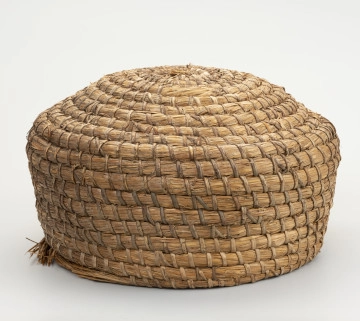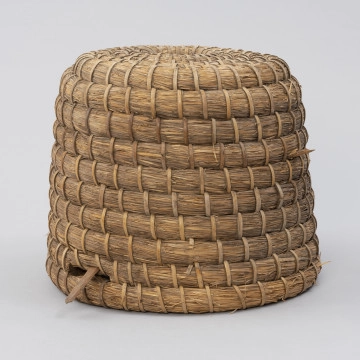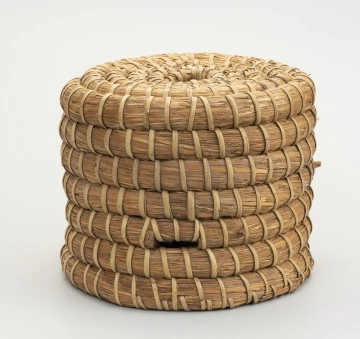
Skep (dome beehive)
1965
National Museum in Szczecin
Part of the collection: Beekeeping
Honey is a food product that not only offers a highly appreciated flavour, but also provides rich health-promoting benefits. For this reason, people have sought to obtain it from the very beginning of times. Originally, it was gathered from the nests of wild bees but, over time, it was followed by apiculture on the basis of which beekeeping emerged. Wishing to breed bees, people had to learn to provide them with the suitable conditions for life. At the turn of the 17th and 18th centuries, beehives called 'skeps' began to be made from straw, usually rye straw. Their construction required a great deal of precision and care because the skeps needed to withstand various atmospheric conditions when placed outdoors. A distinctive feature of straw hives was the fact that they had no base and access to the inner space was restricted by the ground on which it was placed. Nowadays, skeps are not used on a large scale. Modern apiaries tend to use a variety of body beehives. However, straw skeps are well suited to small-scale ecological or amateur apiaries. The ethnographic collection of the National Museum in Szczecin houses a dozen or so skeps. They vary in shape and size. The featured one, dating from the first half of the 20th century, is shaped like a truncated cone and is one of the smaller beehives of its type in the collection. Agnieszka Słowińska
Author / creator
Object type
beehive
Technique
coiling (weaving)
Material
rye straw, wicker
Origin / acquisition method
donation
Creation time / dating
Creation / finding place
Owner
Muzeum Narodowe w Szczecinie
Identification number
Location / status

unknown
1965
National Museum in Szczecin

unknown
1890 — 1910
National Museum in Szczecin

unknown
1901 — 1920
National Museum in Szczecin
DISCOVER this TOPIC
Castle Museum in Łańcut
DISCOVER this PATH
Educational path
0/500

We use cookies to make it easier for you to use our website and for statistical purposes. You can manage cookies by changing the settings of your web browser. More information in the Privacy Policy.
We use cookies to make it easier for you to use our website and for statistical purposes. You can manage cookies by changing the settings of your web browser. More information in the Privacy Policy.
Manage cookies:
This type of cookies is necessary for the website to function. You can change your browser settings to block them, but then the website will not work properly.
WYMAGANE
They are used to measure user engagement and generate statistics about the website to better understand how it is used. If you block this type of cookies, we will not be able to collect information about the use of the website and we will not be able to monitor its performance.